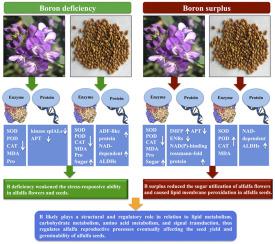Ecotoxicology and Environmental Safety ( IF 6.2 ) Pub Date : 2021-03-03 , DOI: 10.1016/j.ecoenv.2021.112083 Lingling Chen , Fangshan Xia , Mingya Wang , Peisheng Mao

|
Boron (B), an essential element for increasing seed yield and germinability in alfalfa (Medicago sativa L.), plays a vital role in its reproductive processes. However, effects of B stress on physiological and proteomic changes in reproductive organs related to alfalfa seed yield and germinability are poorly understood. In order to gain a better insight into B response or tolerance mechanisms, field trials were designed for B deficiency (0 mg B L−1), B sufficiency (800 mg B L−1), and B surplus (1600 mg B L−1) application during alfalfa flowering to analyze the proteomics and physiological responses of alfalfa ‘Aohan’ reproductive organs. Results showed that B deficiency weakened the stress-responsive ability in these organs, while B surplus reduced the sugar utilization of ‘Aohan’ flowers and caused lipid membrane peroxidation in ‘Aohan’ seeds. In addition, four upregulated stress responsive proteins (ADF-like protein, IMFP, NAD(P)-binding Rossmann-fold protein and NAD-dependent ALDHs) might play pivotal roles in the response of ‘Aohan’ reproductive organs to conditions of B deficiency and B surplus. All of the above results would be helpful to understand the tolerance mechanisms of alfalfa reproductive organs to both B deficiency and B surplus conditions, and also to give insight into the regulatory role of B in improving seed yield and germinability in alfalfa seed production. In summary, B likely plays a structural and regulatory role in relation to lipid metabolism, carbohydrate metabolism, amino acid metabolism, and signal transduction, thus regulates alfalfa reproductive processes eventually affecting the seed yield and germinability of alfalfa seeds.
中文翻译:

生理和蛋白质组分析揭示缺硼和剩余对紫花苜蓿的影响(紫花苜蓿L.)生殖器官
硼(B)是提高苜蓿(Medicago sativa L.)种子产量和发芽率的重要元素,在其生殖过程中起着至关重要的作用。但是,人们对B胁迫对紫花苜蓿种子产量和可发性有关的生殖器官生理和蛋白质组学变化的影响了解甚少。为了更好地了解B的反应或耐受机制,针对B缺乏(0 mg B L -1),B充足(800 mg B L -1)和B过量(1600 mg B L -1)进行了田间试验。)在苜蓿开花期间的应用,以分析苜蓿'Aohan'生殖器官的蛋白质组学和生理反应。结果表明,硼缺乏会削弱这些器官的胁迫反应能力,而硼过剩则会降低'Aohan'花的糖利用,并导致'Aohan'种子的脂质膜过氧化。此外,四种上调的应激反应蛋白(ADF样蛋白,IMFP,NAD(P)结合Rossmann-fold蛋白和NAD依赖性ALDHs)可能在'Aohan'生殖器官对B缺乏症的反应中起关键作用。和B盈余。以上所有结果将有助于了解紫花苜蓿生殖器官对B缺乏和B剩余条件的耐受机制,并深入了解B在提高苜蓿种子生产中的种子产量和可发性方面的调节作用。总之,B可能在脂质代谢,碳水化合物代谢,氨基酸代谢和信号转导方面起结构和调节作用,从而调节苜蓿的繁殖过程,最终影响种子的产量和苜蓿种子的发芽性。









































 京公网安备 11010802027423号
京公网安备 11010802027423号